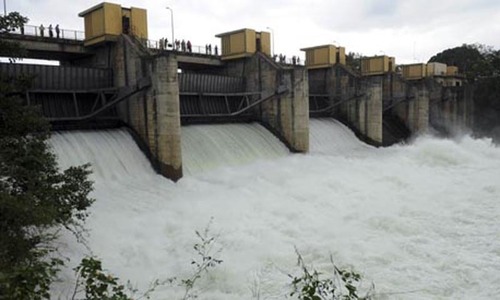Much has been said and written about the water crisis in Pakistan.
With intermittent water supplies, poor water quality and a dire warning from the Pakistan Council of Research in Water Resources that the country may run dry by 2025, the need for a comprehensive set of solutions to combat this problem has never been more pressing.
Any efforts towards this end must undoubtedly address the many aspects that this problem spans, from the purely economic and engineering challenges involved to the socio-political dimensions these challenges take on.
Against this backdrop, a rallying cry for the building of new dams has gained strength. While this may prove to be a useful step towards alleviating part of Pakistan’s water deficit, the call for dams neglects an equally important aspect of the country’s water crisis — non-revenue water (NRW).
NRW refers to water that is successfully delivered by utilities into the distribution network but whose equivalent bill is never collected by them.
This could be due to several reasons, broadly falling into two categories:
(a) real losses, referring to water getting physically lost due to problems such as leaks or tank overflows somewhere along its path from the distribution network to the consumer; and
(b) apparent losses, referring to water successfully being delivered to the customer but whose equivalent bill is not collected due to issues such as billing errors, unauthorised consumption or under-registering meters.
Related: ‘We are more than 20 years late in steps being taken for water conservation’
In the United States, for example, NRW consists on average of around 10-15 per cent of the water being produced by American utilities, and which already costs them millions of dollars in revenue loss every year.
In Pakistan, in contrast, this figure is on average around 40-50pc, reaching as high as 75pc in places such as Gujranwala. In lay terms, this translates to Pakistani utilities losing billions of rupees in revenue each year.
This is an alarming statistic, and one that should give pause to anyone serious about solving the country’s water problem.
With an NRW this high, Pakistani water utilities can hardly cover the costs of their operations and maintenance. These costs are then borne by the local population, who often rightly complain that they pay too high a price for a service that they really ought to receive as a universal human right.
This leads to unauthorised consumption, which in turn increases NRW. This vicious cycle can, at least in part, be broken by a mass improvement in the country’s aging water infrastructure.
The most immediate benefit an improved infrastructure would bring about is the reduction in real losses resulting from leaks and other distribution failures.
In the longer run, it can lead to fewer service interruptions, cleaner water and improved sanitation. To provide some perspective around these longer term returns, the economic cost of inadequate sanitation alone is estimated to be roughly Rs344 billion ($5.7 billion).
In the US, there has been a recent drive to apply data science and machine learning techniques to meter-level water consumption data to try and reduce NRW.
Read next: Re-thinking the national water policy
This approach has helped American utilities recover millions of dollars in revenue, meet water conservation and consumption reduction goals in drought-struck areas, and reduce service disconnections to financially challenged consumers of water.
There is no reason why Pakistan cannot do the same. However, a major obstacle to doing so is the sheer lack of metering technology across the country’s water infrastructure.
In Punjab, for example, only around 3pc of all water consumption is recorded through meters. This is especially problematic, since Punjab is not only the most populous province in the country but also one whose economy heavily relies on agriculture.
Given that nearly 95pc of Pakistan’s water consumption occurs in agriculture, it is safe to predict that metering Punjab’s water consumption alone could immediately help reduce NRW and yield great economic returns to the entire country.
The benefits of metering do not end there.
If one knows how much water each customer is consuming, one could charge customers in proportion to their water consumption.
Up next: Dam alternatives?
This in turn encourages water conservation, a healthy practice to adopt for a country facing the risk of water depletion.
Moreover, in developing countries such as Pakistan, metering is necessary to provide consumption-based water subsidies to the poor who might not otherwise be able to access clean water.
In short, we cannot expect to have a sustainable water infrastructure with the levels of NRW as high as they currently are in the country, even if we build dams.
A water policy that fails to focus on improving the currently existing water distribution infrastructure is doomed to fail.
In a post-election Pakistan, many people are filled with the hope of something new and better. In the spirit of such times, let us hope that the new government will adopt sensible and concrete measures to solve the country’s water crisis, before it is too late.
Are you researching Pakistan's water crisis? Share your insights with us at blog@dawn.com














































